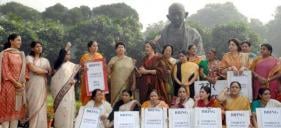An EPW Editorial
Monday, March 22, 2010
Flawed Civil Nuclear Liability Bill
All eyes are on how the government reworks the Civil Nuclear Liability Bill
Wednesday, March 17, 2010
Tuesday, March 09, 2010
The Congress' pusillanimity and "real" interests
On the historic occasion of the 100th anniversary of "Women's Day", there were more than a few expectations. On the positive side, considering more than two thirds support for the "Women's Reservation Bill" -which envisages 33% reservation for women in parliamentary and legislative assembly constituencies in the country- the bill was supposed to be passed today with far more ease than envisaged in all these years of talking about the bill. It was expected that the overwhelming consensus on the issue would ensure that despite the vociferous but miniscule opposition, the bill would have been passed today on a momentous day. On the flip side, that "ruffian" members of parliament, belonging to the Rashtriya Janata Dal and the Samajwadi Party would take recourse to the crudest methods to prevent any discussion or passing of the Women's Reservation Bill in both the Houses was very much expected.
Yet, to the frustration and anger of many of us, only the negative expectation bore fruit. The "ruffian" members opposed to the bill behaved in a manner that was even worse than expected. Snatching papers from the Rajya Sabha chairperson and vice president Hamid Ansari was just a sampler of a bunch of crude acts from uncouth MPs wanting to disrupt the sureshot passage of the bill.
The Congress party, instead of seizing the initiative suddenly developed cold feet, lacking a strategy to tackle the lumpen but dedicated opposition from parties which were also giving outside support to the ruling coalition. The rationale provided was that, since action on the bill necessitated a Constitutional Amendment, precedence and Parliamentary culture demanded that the Bill be debated. And since the discussion was not possible in a situation of pandemonium as created by the aforementioned parties, the logical conclusion was to adjourn Parliament to the next day.
Such an argument seems very specious. As mentioned earlier, the expectations of disruption were always very high. It would easily been possible to evict the lumpen MPs who were already taking Parliamentary behaviour to depths scratching the nadir of indecorum. Rules of house behaviour clearly dictate that in certain irretrievable circumstances, MPs can indeed be evicted by House marshalls and who could enter the House in case of a vote. But the pusillanimous Congress only wanted to play "safe", and the real reason is apparent.
The threat of withdrawal of support from the RJD and the SP meant that the buffer of MPs beyond the 272 magic figure (of majority) had suddenly dried up for the ruling coalition. If numbers stood as they were now, the Congress led UPA would have only 275 MPs in support of the ruling coalition. Considering that the Finance Bill was due to be debated and voted on, not very long later, the Congress surely got jittery looking at the insecurity of the numbers. The BJP and the left parties, who otherwise support the Women's Reservations Bill have expressed opposition to various features of the Union Budget and are expected to vote against the government. In its anxiety to prevent a loss in support over the Finance Bill, the government thought it safe to prolong the hiatus vis-a-vis the long pending Women's Reservation Bill either by atleast trying to buy time and winning over the recalcitrant outfits by tomorrow or by simply bringing the Bill to cold storage.
Either ways, if the Congress does not show the enthusiasm to pass the bill, it will betray a strong anti-people angle to its functioning that has been starkly evident ever since its re-election to power in 2009. Be it over the callous provisions of the Nuclear Liability Bill in order to satisfy American nuclear business suppliers at the cost of potential hazard victims in India or in the manner a pro-corporate and inflationary budget was passed at a time when food prices had affected most sections of the Indian population, the starkly sectional character of UPA-II, favouring the rich and well off over everyone else is evident.
This writer would love to be proved wrong on March the 9th by the ruling coalition and if it shows the gumption to take on the minority few rabble rousers who are opposed to the Women's Reservation Bill and get it passed - a long overdue step in Parliamentary action that has wide public and legislative approval.
Tuesday, March 02, 2010
Talking and its merits
The governments of India and Pakistan owe it to their citizens to engage in talks and to act substantively.
An EPW Editorial
An EPW Editorial
Monday, March 01, 2010
Subscribe to:
Comments (Atom)
